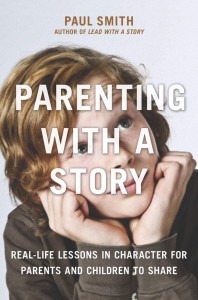Podcast: Play in new window | Download | Embed
Subscribe: RSS
Podcast (parenting-with-a-story-podcast-series): Play in new window | Download | Embed
Subscribe: RSS
 When Vijay was a young boy growing up in Chennai, India, his grandmother shared with him a piece of wisdom that most readers will be familiar with, regardless of where you grew up. She told him that if you put one rotting mango in a basket of good mangoes, soon the entire lot will spoil. In the United States the metaphor chosen is often an apple, and I’m sure other fruits are used in other countries.
When Vijay was a young boy growing up in Chennai, India, his grandmother shared with him a piece of wisdom that most readers will be familiar with, regardless of where you grew up. She told him that if you put one rotting mango in a basket of good mangoes, soon the entire lot will spoil. In the United States the metaphor chosen is often an apple, and I’m sure other fruits are used in other countries.
But the message is the same. Choose your friends wisely, because they have a significant influence on who you become. Now for a many children, that metaphor is where the discussion and learning ends. Without ever seeing how that might play out in someone’s life, it’s hard for a child to make the connection. Unfortunately, Vijay had an opportunity to see firsthand how one bad mango could completely ruin the life of another young boy in Chennai.
In the seventh grade, Vijay had a classmate named Bala. Vijay and Bala attended classes together and played kabaddi (similar to wrestling). Vijay describes Bala as a happy-go-lucky sort. He was always good at getting a laugh from the other students, and even the teachers. He got to school early every morning, would read quietly when he was supposed to, was a good student, generally obedient, and well liked. Bala’s father would even come to school to have lunch with him once a week, making him the envy of the boys who weren’t so lucky.
Then in the tenth grade, trouble moved in. A new boy from Bombay showed up at school, and he was a rule breaker. He quickly developed a close following, and Bala was among them. Soon, all the boys adopted the bad behavior of their new group leader. They started skipping school reg- ularly and would get caught smoking and drinking. Vijay recalled “They were constantly in the principal’s office for one thing or another.” But for some reason, Bala seemed to take the fall for most of their misdeeds, which he wore as a badge of honor. It almost certainly cemented his place in the group as the fall guy that kept the rest of them from getting in as much trouble. The slick kid from Bombay always seemed to get away without punishment. And now that he was one of these “cool kids” Bala wasn’t as interested in his dad’s lunchtime visits.
In the eleventh grade, this group’s behavior continued to escalate. In one particularly memorable event, the boys allegedly hired call girls and took them to Bala’s house when his parents were at work. When Bala’s father unexpectedly came home midday, the entire group was caught in the act. For once the entire group felt the brunt of the punishment. Unfortunately, it wasn’t enough to curb their increasingly dangerous lifestyle.
Later that year, six of the boys decided to party at a seaside resort town, about thirty-five miles south of Chennai. As usual, all were drinking heavily. Then they decided to go for a swim in the ocean. All six went out. But only five came back, and Bala was not one of them. In his drunken state, he couldn’t swim well enough. And in their drunken state, his friends were in no position to save him. Bala’s barely recognizable body washed ashore a week later.
When word reached the school, Vijay immediately thought of his grandmother’s mango story. This kid from Bombay had moved in and spoiled a whole group of good kids. And it cost Bala his life. It left a deep impression on Vijay. Twenty years later, Vijay has two children of his own, and he’s taught them both the wisdom of the rotten mangoes. And it seems to be working. At the age of seven, his daughter, Kaveri, came home and asked Mom and Dad if she could have a friend over to play. Without being asked, she made a list of the qualities this little girl possessed that made her want to have her as a friend and presented the list to her parents: “She listens to the teachers, works hard, is kind and polite, and prays to God.”
And his five-year-old son, Surya, added, “And she’s always smiling. I like her too.” Vijay was proud of the wise choice his children were making. And of course they invited the young girl to play. Kaveri (and Surya) went to bed that night with the joy of having a new friend. And Vijay went to bed without having to worry about any rotten mangoes in his children’s basket of friends.
As with all of my stories, I encourage you to share this with your kids, and then have a discussion about it. Here are some questions to get you started:
- Why do you think Bala liked the new boy from Bombay?
- Why do you think the other boys started acting badly when they became friends with the new boy?
- What qualities do you think your parents would want in the friends you choose?
- What qualities do YOU want in the friends you choose?
- Can you think of a situation where you might want to make friends with someone you don’t like?
[You can find this and over 100 other character-building stories in my book, Parenting with a Story.]
—
 Paul Smith is a one of the world’s leading experts on business storytelling. He’s a keynote speaker, storytelling coach, and bestselling author of the books Lead with a Story and Parenting with a Story.
Paul Smith is a one of the world’s leading experts on business storytelling. He’s a keynote speaker, storytelling coach, and bestselling author of the books Lead with a Story and Parenting with a Story.

 Connect with him via email here.
Connect with him via email here.
Follow him on Facebook, LinkedIn, Twitter.
Sign up for his newsletter here to get one new story a week delivered to your inbox.

